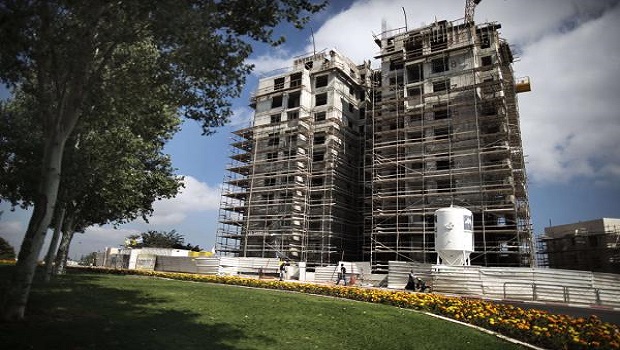
Israelis walk past the construction site of a new housing project at the Jewish settlement of Gilo in Israeli-annexed Arab east Jerusalem on August 12, 2013. (AFP PHOTO/MENAHEM KAHANA)
The names of the 26 prisoners were published yesterday. There are 48 hours for any party to appeal against the decision.
The prisoners are expected to be released on Tuesday, on the eve of the first round of talks, due to start on Wednesday. More prisoners are due to be released in three stages, with their names to be decided later by Israeli security.
In another development, Israel has approved the building of more than 1,000 new settlement units in Jerusalem and the West Bank, in a move that has been met with widespread criticism.
Israeli Housing and Construction Minister Uri Ariel said the settlement units would be built in the West Bank and Jerusalem to “meet the needs of Israeli citizens.” The Housing and Construction Ministry announced on Sunday plans for the construction of around 1,200 units, including 800 in Jerusalem and 400 in the West Bank.
Some Israeli officials criticized the timing of the announcement, saying it risked derailing peace talks before they even began, while Palestinian leaders accused the Israeli government of trying to sabotage the talks.
Minister of Finance Yair Lapid said the decision was a provocation to the American side and a hindrance to the peace talks. Member of the Knesset (MK) Amram Mitzna of the Movement Party described the decision as “crazy.” Another MK, Zahava Gal-On, leader of the opposition Meretz Party, said the decision to build new homes was like an “explosive” planted by the [Israeli] government to destroy the negotiations with the Palestinians.
The decision was announced while the US special envoy for the peace talks, Ambassador Martin Indyk, was in a meeting with Palestinian President Mahmoud Abbas in Ramallah.
The Palestinian Authority has previously complained to the US that the continuing settlement activity could jeopardize the peace talks.
Palestinian negotiator Mohamed Ishtiyeh issued a statement condemning Israel’s decision, saying it was “evidence that Israel was not serious about the talks and that what Israel wanted from intensifying settlement activity was to destroy the basis for a solution supported by the international community, which calls for the establishment of a Palestinian state on the 1967 borders.”
He added: “Israel was calling for unconditional talks, and today it places conditions and new realities on the ground on a daily basis, in order to resolve the talks in a way which it sees suitable.”
He called on the US to put pressure on Israel to prevent further settlement expansion.
He said: “What is needed from the US sponsor is to have a clear and decisive position to stem this Israeli attack on the West Bank, especially Jerusalem.”
